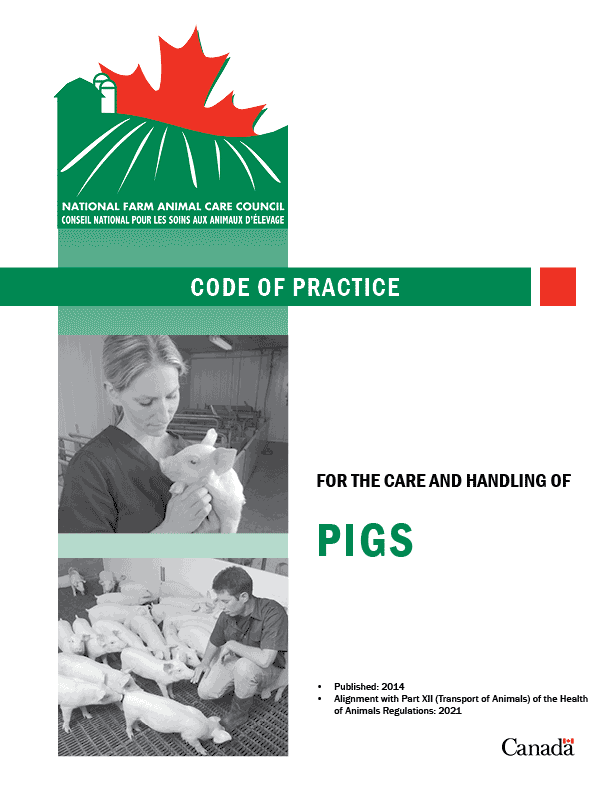Codes Of Practice
Developed through NFACC
Under Revision
Archived Recommended Codes of Practice
Code Development Process
Pigs
CODE UNDER REVISION
The Code of Practice for the Care and Handling of Pigs was released in 2014. The pig Code’s 5-year review was initiated in 2019. A detailed report about this review, along with information about an effort to amend the pig Code, can be found here. An update to the pig Code was initiated in 2024.
Code update timeline:
- Start: September 2024
- Public comment period: Fall 2026 / Winter 2027
- Projected completion: March 2028
Timeline for all Codes of Practice being amended or updated.
Code update resources:
Current Code of Practice (2014) and related resources are below.
Committees
Code Committee members
The Code Committee is populated in accordance with Step 1 of NFACC’s Code development process.
| Role | Committee Member | Organization |
| Producer representative | Brent Moen (Chair) | Canadian Pork Council |
| Yvan Fréchette | Canadian Pork Council | |
| James Reesor | Canadian Pork Council | |
| Jonathan Sawatzky | Canadian Pork Council | |
| Dickson Gould | Canadian Pork Council | |
| Federal government | Marie-Odile Rozon | Canadian Food Inspection Agency |
| Federal government | Angela Rouillard | Agriculture and Agri-Food Canada |
| Animal welfare advocacy association | Abby Tillotson | Humane Canada |
| Provincial animal protection enforcement authority | Carly Atrooshi | Ontario Ministry of the Solicitor General |
Provincial government representative with responsibilities in animal welfare | Robyn Harte | Manitoba Agriculture |
| Retail and food service organization | Alexandra Leclerc | Retail Council of Canada |
| Processor | Tony Millington | Canadian Meat Council |
| Transporter | Bill Rempel | Steve's Livestock Transport |
| Veterinarian | Karine Talbot | Canadian Veterinary Medical Association |
| Technical expertise | Egan Brockhoff | CPC Chief Veterinary Officer |
| Researcher/academic | TBD | Scientific Committee Chair |
Scientific Committee Members
| Name | Named by |
| Yolande Seddon, PhD | Canadian Society of Animal Science (and Canadian Veterinary Medical Association) |
| Terri O'Sullivan, DVM, PhD, MA | Canadian Veterinary Medical Association |
| Patricia Turner, DVM, DVSc, DACLAM, DABT, DECAWBM (AWSEL) | Canadian Veterinary Medical Association |
| Luigi Faucitano, PhD | Canadian Society of Animal Science |
| Jen-Yun Chou, PhD | International Society of Applied Ethology |
| Clover Bench, PhD | International Society of Applied Ethology |
There are various ways to view the Code:
- HTML version (or select from the Table of Contents below)

- PDF version (1.9 MB)
There are a limited number of hard copies of this Code. NFACC encourages use of the electronic version and does not store hard copies. If hard copies are required, please contact the Canadian Pork Council.
Please note that content in the transportation section of this Code, along with additional transportation-related content (e.g., glossary terms) that had referenced or reflected the outdated version of Part XII (Transport of Animals) in the Health of Animal Regulations (HAR), or the now archived Compromised Animals Policy, has been updated to align with the amended regulations, which took effect on February 20, 2020. Hard copies of the Codes that were printed prior to this alignment will not include these updates. For clarity, Codes that have been updated will include a statement on the front cover that reads “Alignment with Part XII (Transport of Animals) of the Health of Animals Regulations: 2021”.
This update process was strictly aimed at revising existing text that no longer aligned with the amended HAR. Every effort was made to respect the original priorities and decisions of the Code Development Committee (e.g., text from the HAR was not added if it was not covered in the original Code). In case of a discrepancy between the hard copy and online version of a Code, the online version shall take precedence.
Other resources
- Scientific Committee report - Review of scientific research on priority issues - July 2012
- Listen to Catherine Scovil presentation at the NFACC conference - October 2013
- NFACC Code development process
- Animal Welfare Research Needs
- Canadian Veterinary Medical Association (CVMA)
- Castration of Piglets – Position Statement
Table of Contents
| Preface | ||
| Introduction | ||
| Glossary | ||
| Section 1 Housing and Handling Facilities | ||
| Section 2 Feed and Water | ||
| Section 3 Animal Health | ||
| Section 4 Husbandry Practices | ||
| Section 5 Transportation | ||
| Section 6 Euthanasia | ||
| References | ||
| Appendices: | ||
| Appendix A - Guidelines for Determining Individual Stall Sizes for Gestating Gilts and Sows | ||
| Appendix B - Recommended Minimum Floor Space Allowances for Gilts and Sows in Group Housing | ||
| Appendix C - Floor Space Allowances for Weaned/Nursery Pigs | ||
| Appendix D - Floor Space Allowances for Grower/Finisher Pigs | ||
| Appendix E - Recommended Minimum Space Allowances for Boars | ||
| Appendix F - Feeder Design | ||
| Appendix G - Water Intake, Recommended Flow Rate and Height of Nipple Drinkers | ||
| Appendix H - The Six Ss: Simple Criteria for Choosing Enrichment for Pigs | ||
| Appendix I - Sow Body Condition Scoring System | ||
| Appendix J - Example of Decision Tree for Euthanasia | ||
| Appendix K - Pig Vision and Flight Zone | ||
| Appendix L - “Should this Pig be Loaded?” Decision Tree | ||
| Appendix M - Temperature - Humidity Index Table | ||
| Appendix N - Methods of Euthanasia | ||
| Appendix O - Resources for Further Information | ||
| Appendix P - Participants | ||
| Appendix Q - Summary of Code Requirements | ||
